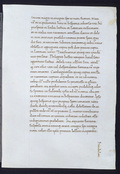University of Saskatchewan Leaf 39
This leaf comes from a rare manuscript of Livy's History of Rome (completed in about 9 A.D.) copied in Italy in the middle of the fifteenth century. It measures 22.5 x 16 cm and its vellum is very well prepared, though some rubbing of the ink has cast a shadow over the text block of some pages. The Humanistic script is crisp, clear, and without adornment; an exception is the Denison leaf, with its striking initial "H." See Denison University Leaf 39 for more information about this manuscript.
Text: This leaf contains the text of Livy's History, Book 26, Chapter 37. A scan of the recto is not currently available. The English translation is that of Cyrus Edmonds (1850), via Project Gutenberg.
 Saskatchewan Leaf 39 Verso
Saskatchewan Leaf 39 Verso
University of Saskatchewan Leaf 39 Verso
 Saskatchewan Leaf 39 Verso Transcription
Saskatchewan Leaf 39 Verso Transcription
immixti magis in ancipiti spe ac metu fuerint. nam Romanis et in prouinciis hinc in Hispania aduersae res, hinc prosperae in Sicilia luctum et laetitiam miscuerant, et in Italia cum Tarentum amissum damno et dolori, tum arx cum praesidio retenta praeter spem gaudio fuit, et terrorem subitum pauoremque urbis Romae obsessae et oppugnatae Capua post dies paucos capta in laetitiam uertit. transmarinae quoque res quadam uice pensatae: Philippus hostis tempore haud satis opportuno factus, Aetoli noui adsciti socii Attalusque Asiae rex, iam uelut despondente fortuna Romanis imperium orientis. Carthaginienses quoque Capuae amissae Tarentum captum aequabant, et ut ad moenia urbis Romanae nullo prohibente se peruenisse in gloria ponebant, ita pigebat inriti incepti, pudebatque adeo se spretos ut sedentibus ipsis ad Romana moenia alia porta exercitus Romanus in Hispaniam duceretur. ipsae quoque Hispaniae quo propius spem uenerant tantis duobus ducibus exercitibusque caesis debellatum ibi ac pulsos inde Romanos esse, eo plus ab L. Marcio tumultuario duce ad uanum et inritum uictoriam redactam esse indignationis praebebant. ita aequante fortuna suspensa omnia utrisque erant, integra spe, integro metu, uelut illo tempore primum bellum inciperent.
 Saskatchewan Leaf 39 Verso Translation
Saskatchewan Leaf 39 Verso Translation
...were in a state of more anxious suspense between hope and fear. For on the side of the Romans, with respect to their provinces, their failure in Spain on the one hand, and their successes in Sicily on the other, had blended joy and sorrow; and in Italy, the loss of Tarentum was an injury and a source of grief to them, while the unexpected preservation of the citadel with the garrison was matter of joy to them. The sudden terror and panic occasioned by the siege and attack of Rome, was turned into joy by the capture of Capua, a few days after. Their affairs beyond sea also were equalized by a kind of compensation. Philip had become their enemy at a juncture somewhat unseasonable; but then the Aetolians, and Attalus, king of Asia, were added to their allies; fortune now, in a manner, promising to the Romans the empire of the east. The Carthaginians also set the loss of Capua against the capture of Tarentum; and as they considered it as glorious to them to have reached the walls of Rome without opposition, so they were chagrined at the failure of their attempt, and they felt ashamed that they had been held in such contempt, that while they lay under the walls of Rome, a Roman army was marched out for Spain at an opposite gate. With regard also to Spain itself, the greater the reason was to hope that the war there was terminated, and that the Romans were driven from the country, after the destruction of two such renowned generals and their armies, so much the greater was the indignation felt, that the victory had been rendered void and fruitless by Lucius Marcius, a general irregularly appointed. Thus fortune balancing events against each other, all was suspense and uncertainty on both sides, their hopes and their fears being as strong as though they were now first commencing the war.